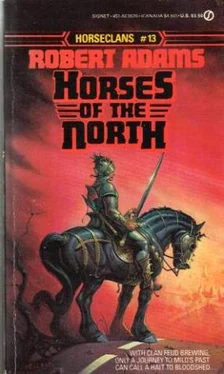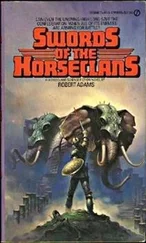According to his own witness and things he had heard, Milo knew that very few of the larger centers of population on the North American continent had actually been nuked. Several of the West Coast cities had been, along with Washington, D. C., Boston, Norfolk, Ottawa, Chicago, New Orleans and Houston, but these had all most likely been struck by missiles launched from submarines, since the High Frontier Defensive Systems had knocked down most of the ICBMs and satellite-launched weapons.
The response had been immediate and must have been devastating in the target areas on the other side of the earth. Milo had, in his travels, seen countless deep, now empty silos sunk into the soil and rock which once had contained the retaliatory missiles and their multiple warheads.
For a few weeks during that terrible period of the past, Milo had had access to powerful radio equipment and had been able to ascertain that few nations had been spared the destruction and subsequent turmoil, disease, starvation and death.
The People’s Republic of China had had several population centers nuked, then almost immediately had found itself fighting invasions across its western and southeastern borders, as well as a concerted seaborne invasion of the Nationalist Chinese from Taiwan, a deadly-serious rebellion in Tibet and assorted smaller uprisings in every province. None of the Chinese contacts had, however, broadcast for long, many only once, and by the end of a month from first contact, all had fallen silent. The Taiwan station lasted only some weeks longer, its last broadcast reporting uncontrollable rioting in urban areas and widespread death from as yet undiagnosed, plaguelike diseases.
The only station Milo had ever been able to reach in the area of western Russia had been a strong signal from Erivan. It had been broadcast in Russian, Armenian, English, French, Turkish, Arabic, Farsi, Hebrew and Italian and had proclaimed in all of these the immediate declaration of a free Republic of Armenia. However, at the end of three days, the station had gone off the air in mid-sentence and had never again been heard, nor had Milo been able to raise a response from it.
London had been nuked, he had discovered, along with Paris, Bonn, Berlin, Copenhagen, Rome, Ankara, Tel Aviv, Cairo, Riyadh, Teheran, Bagdad, Damascus, Beirut, Belgrade and countless other European and Middle Eastern population centers, ports and places of greater or lesser military importance. The Russian army had swept across most of Western Europe almost unopposed until a sudden onslaught of the new diseases had more than decimated it and its foes indiscriminately along with the civilian noncombatants around them.
A transmission from Belfast apprised Milo that its decades-long turmoil had, if anything, become unbelievably chaotic. While refugees from devastated England and Scotland poured into every port, the Protestant majority were openly battling Catholic and Marxist rebels in cities and countrysides and trying to make ready for an imminent invasion of its southern borders by the army of the Irish Republic. The transmitter went off the air after the third broadcast, and Milo never could raise it again. He did raise a Dublin station, some weeks later, crowing about a “great, God-sent victory” that had “reunited Holy Ireland and driven the Sassenachs into the sea.” But the same announcer had deplored the terrible plague that the army had brought back from the north that was even as he spoke baffling all Irish doctors. Dublin continued to broadcast for several weeks more, but it became increasingly sporadic and its last few transmissions were all in some guttural language that Milo assumed to be an obscure or archaic Gaelic, nor would the station answer him in English. At last, it became silent, no response at all.
The Southern Hemisphere seemed less affected by the diseases and destruction than did the Northern, as Milo recalled. Durban, Johannesburg, Pretoria, Uppington and countless other large and smaller private and commercial broadcasts reached him as long as he had access to his own equipment. Quite a number of South American private, government and commercial stations were also on the air when he, perforce, left it. He was never able to pick up anything from Mexico, Central America or the northern and western Caribbean, but he monitored powerful though sporadic transmissions from some variety of underground research facility located somewhere in central Florida. This broadcaster, too, was still on the air when he had to move on, as were several locations in Antarctica.
According to the South African broadcasts, along with a few isolated signals from other areas, both northern and central Africa, from Atlantic to Indian Oceans, were aseethe with invasions, counterattacks, rebellions and every conceivable type and size of conflict along every conceivable racial, tribal, religious, political or social line. Egypt, seemingly not at all certain whether the nuking of Cairo had come from Israel or Libya, had launched retaliatory attacks on both countries. Libya was in a vise, being attacked as well by Algeria, Tunisia and a shaky coalition of Niger and Chad.
By the time Milo first monitored African broadcasts, the Union of South Africa’s armed forces had already conquered Botswana, Rhodesia and part of Mozambique, reconquered Namibia, and were pushing on into southern Angola and Zambia. Their military successes were abetted by the facts that all these countries were racked by widely scattered rebellions and uprisings, other borders were in serious need of protection from the incursions of other neighbors, and while hundreds of thousands, even millions—civilians and soldiers alike—were dropping like flies from the new plaguelike diseases, the white South Africans alone of all on the continent seemed immune.
Half a dozen Indian cities had been nuked. Nonetheless, the Indian armed forces seemed to be in the process of attacking across borders on nearly every side, even while riots, insurrections and rebellions on a grand scale vied with disease to kill most Indians.
Those survivors of the Vietnamese army that had invaded nuclear-stricken and otherwise beset China had brought back with them the plaguelike diseases, and these seemed to spread through Southeast Asia like wildfire, accompanying boatloads of starving, panic-stricken refugees to the Philippines and the islands of Indonesia. Australia had not received a single nuke, had utilized the harshest of draconian methods to drive off or kill would-be arrivals from plague-infested areas, but despite it all, still had found the incurable disease raging over the island continent from north to south, sparing only the scorned aborigines, oddly enough. Milo got most of this information at second hand from a Wellington, New Zealand, station, those islands having but recently somehow acquired the dreaded and deadly disease.
Military installations on the Hawaiian Islands had been nuked, and so had Tahiti. Otherwise, Oceania seemed from its various radio transmissions to be doing better than the most of the world. He was unable to get any sort of response from Japan, however.
South America seemed to be suffering almost as much as Africa, with a fierce war in progress between Argentina and Chile, another between Bolivia and Chile. Bolivia also was fighting Peru, which was in the process of trying to conquer neighboring Ecuador. Colombia too seemed to have designs upon Ecuador, as well as on Venezuela. Venezuela herself had moved into Guyana, taken over Trinidad, and was in process of marshaling an assault upon Surinam. Brazil had occupied French Guiana and was filling the airwaves with a barrage of nuclear-tipped threats against anyone who tried to violate Brazilian sovereignty or territorial aspirations. Paraguay and Uruguay both were fighting two-front defensive wars against Brazil and Argentina. It was from a South American source that Milo learned that the Panama Canal had been struck by, at the least, two nuclear missiles, one seeming to come from somewhere out in the Pacific Ocean, one or more others from the Caribbean side.
Читать дальше












